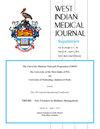南美洲土著人民和主要居住在多巴哥的非洲后裔“信不信由你”的医学征服事件
IF 0.3
4区 医学
Q4 MEDICINE, GENERAL & INTERNAL
引用次数: 0
摘要
除了Roth(1970)和Johannes(1963)等少数富有冒险精神的人类学家所做的专业工作外,人们对委内瑞拉东北部的瓦劳和委内瑞拉马拉开波湖附近的祖利亚州的Guajiro对现代世界对抗疗法和传统医学的巨大影响知之甚少。在特立尼达和多巴哥圣奥古斯丁的西印度群岛大学读本科期间,我冒险前往委内瑞拉,为我“饥饿”的加勒比研究论文寻找“食物”。几年后,在我在美利坚合众国(美国)攻读研究生期间,我发现了类似的“食物”,这激发了我关于瓜德罗印第安人糖尿病发病率和管理的研究论文的食欲。我发现,尽管这两个民族的地理和地形存在差异,他们在饮食、生活方式、传统信仰、家庭关系和习俗等方面仍然存在显著的相似性。在我在委内瑞拉相对偏远的地区逗留期间,以及在我与这些伟人的社交活动中,我发现他们在直接环境中几乎完全不依赖现代医务人员和现代医学。瓦劳人,也被称为“船民”,以广阔的奥里诺科河支流的动物群和茂密丛林的植物群为生,这些植物和其他食物富含各种植物和营养疗法。本文章由计算机程序翻译,如有差异,请以英文原文为准。
A "Believe It or Not" Episode of Medical Conquests by the Indigenous Peoples of South America and the African Descendants Domiciled Mainly in Tobago
Except for the professional work conducted by a few adventurous anthropologists such as Roth (1970) and Johannes (1963), little is actually known about the great impact that the Warao of north eastern Venezuela and the Guajiro of Zulia State near to Lake Maracaibo, Venezuela, have made on both allopathic and traditional medicine in the modern world.
During my undergraduate years at the University of the West Indies in St Augustine, Trinidad and Tobago, I ventured out to Venezuela in search of 'food' for my 'hungry' Caribbean Studies paper. Years later, during my postgraduate years in the United States of America (USA), I found similar 'food' to whet the appetite of my research paper on the incidence and management of diabetes mellitus among the Guajiro Indians and I discovered that in spite of the geographical and topographical differences in the physical locations of these two ethnic groups, there still exist remarkable similarities in their food intake, lifestyle, traditional beliefs, family ties and customs.
In my sojourns through relatively remote parts of Venezuela and during the course of my social interludes with these great people, I discovered that they were almost totally non-dependent on modern medical personnel and modern medicine within their immediate environment. The Warao, also known as the 'Boat people', survive on the fauna of the tributaries of the vast Orinoco River and the flora of the dense jungle that yield fresh vegetation and other foods that are loaded with a myriad of botanical and nutritional cures.
求助全文
通过发布文献求助,成功后即可免费获取论文全文。
去求助
来源期刊

West Indian Medical Journal
医学-医学:内科
CiteScore
0.20
自引率
0.00%
发文量
0
审稿时长
4-8 weeks
期刊介绍:
The Journal is international in scope, with author and editorial contributions from across the globe. The focus is on clinical and epidemiological aspects of tropical and infectious diseases, new and re-emerging infections, chronic non-communicable diseases, and medical conditions prevalent in the Latin America-Caribbean region, and of significance to global health, especially in developing countries. The Journal covers all medical disciplines, as well as basic and translational research elucidating the pathophysiologic basis of diseases or focussing on new therapeutic approaches, and publishes original scientific research, reviews, case reports, brief communications, letters, commentaries and medical images. The Journal publishes four to six issues and four supplements annually. English is the language of publication but Abstracts are also duplicated in Spanish. Most of the articles are submitted at the authors’ initiative, but some are solicited by the Editor-in-Chief. Unless expressly stated, the Editorial Board does not accept responsibility for authors’ opinions.
All papers on submission are reviewed by a subcommittee. Those deemed worthy for review are sent to two or three reviewers (one of the three might be a statistician if necessary). The returned papers with reviewer comments are reviewed by the Editor-in-Chief. Papers may be rejected, accepted or sent back to authors for revision. Resubmitted papers from authors are reviewed by the Editor-in-Chief and may be sent back to reviewers or a final decision made by Editor-in-Chief. The decision of the Editorial Board is final with regards to rejected articles. Rejected articles will not be returned to the authors. The editorial subcommittee has the right to return sub-standard manuscripts to the authors, rather than passing them on to the reviewers. This implies outright rejection of the manuscript.
 求助内容:
求助内容: 应助结果提醒方式:
应助结果提醒方式:


